
Sunday, 30 October 2005
Scary stories

Friday, 28 October 2005
Meshforum
Their mission statement says:
Networks form the basis of everything, from how your body works to who you know, from how power is distributed to how the store on the corner is kept stocked. Networks are in the news, from the elections to anti-terrorism, to investigations of financial markets and the Blackout in the US.
Whether you are an academic, a business leader, or a politician, understanding Networks is a requirement for success in the 21st century. Recent research has shown similarities in the shape, structure, and growth of networks across many fields.
MeshForum will bring together experts and leaders from many fields for two days of Connecting Networks. In a single, highly participatory track, panels of experts and select speakers will cover topics from summarizing current academic research to techniques for navigating and activating networks in specific industries.
Exchanging knowledge and different views and perspectives will be the order of the day.
To be held May 2nd and 3rd in Chicago with an opening reception on May 1st. MeshForum will have a maximum size of 300 attendees.
If you are interested in attending, presenting at, or sponsoring MeshForum, please contact Shannon Clark.
To be kept informed about what is happening with MeshForum, keep checking our website, or sign up for our MeshForum Updates mailing list at YahooGroups.
Thursday, 27 October 2005
Technology, sociology, and networks
- Jon Kleinberg's home page: Includes his class syllabus for "Information Networks" as well as pdf's of his many network-related papers, including "Graphs over time," which won paper of the year at the 2005 ACM Knowledge Discovery and Data Mining conference.
- Physicists on Networks: Links to arXiv, an online repository for recently released papers in physics, computer science, mathematics, and biology. The Connectedness link to arXiv shows you all papers published within the last 12 months with "social" and "network" in the abstract.
Wednesday, 26 October 2005
Networks maps of government scandal
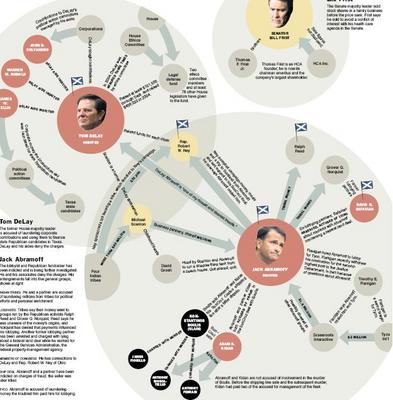 Wow! There is a lot of information on the page (maybe too much).
Wow! There is a lot of information on the page (maybe too much).The widely recognized master of these kinds of network-storytelling pictures was Mark Lombardi (1951-2000), who elevated these diagrams to an art form. See here for some selections of Lombardi's work, like this one:

You can also read a critical overview of Lombardi's life and work here.
Saturday, 22 October 2005
The diabolical dyadic cabal
A high-ranked aide to former US Secretary of State Colin Powell has told the NY Times that Bush policy is run by a diabolical dyadic cabal.
The aide, Lawrence Wilkerson, suggested that the dysfunction within the administration was so grave that "if something comes along that is truly serious, truly serious, something like a nuclear weapon going off in a major American city, or something like a major pandemic, you are going to see the ineptitude of this government in a way that will take you back to the Declaration of Independence."
"What I saw was a cabal between the vice president of the United States, Richard Cheney, and the secretary of defense, Donald Rumsfeld, on critical issues," he said.
Tuesday, 18 October 2005
Jon Kleinberg on information networks
Wednesday, 12 October 2005
The persistent power of the go-to guy
 g are immediately forthcoming, but Lazer and his team are doing other interesting things in the space of social networks and government.
g are immediately forthcoming, but Lazer and his team are doing other interesting things in the space of social networks and government.Monday, 10 October 2005
Mapping new worlds for competitive advantage
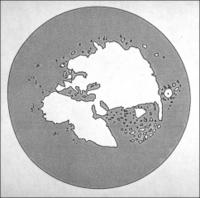 commemoration of white male hegemony. Either way, those who get the day off from work probably take it, while the rest of us grumble at having to spend a holiday at our desks.
commemoration of white male hegemony. Either way, those who get the day off from work probably take it, while the rest of us grumble at having to spend a holiday at our desks.This kind of controversy often happens when people see one thing from different points of view--a difference that maps are very good at revealing. For example, at right is a typical map of the world from 1492. Love him or hate him, we can credit Columbus for sailing into the unknown with little more to guide him than the courage of his convictions. We can also thank Columbus and his contemporaries for helping us see the world's geography more for what it is, and less as a projection of our own philosophy.
Of course, no matter how hard we try to be objective in our map-making, we will always be skewing
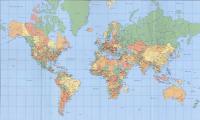 things one way or another. The Mercator Projection is a classic example of objective mapmaking that in fact severely distorts surface area. At the opposite extreme, consider the politically neutral logo of the United Nations, which has dubious navigational value. Which of these is the right map? The answer is-- it depends on what you want to use it for.
things one way or another. The Mercator Projection is a classic example of objective mapmaking that in fact severely distorts surface area. At the opposite extreme, consider the politically neutral logo of the United Nations, which has dubious navigational value. Which of these is the right map? The answer is-- it depends on what you want to use it for.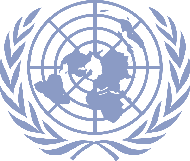
Today's leaders rely no less on vision and courage than Columbus did, but they also have much better maps to guide them; and those who possess superior maps have a decided advantage over their competitors. For a rigorous analysis of this advantage, a good place to start reading is the work of David Krackhardt. His notion of cognitive social structures deflates our unrealistic hope of finding the one true social map, and replaces it with a multiplicity of perspectives. Not all perspectives are created equal, however. Especially when it comes to perceptions of advice-giving, those with more accurate organizational maps are predominantly those with more power and influence.
Thursday, 6 October 2005
Conflict: something we can all agree on
- "Productive Friction: How Difficult Business Partnerships Can Accelerate Innovation," by John Hagel III and John Seely Brown, in the February 2005 Harvard Business Review.
- "Want Collaboration? Accept--and Actively Manage--Conflict," by Jeff Weiss and Jonathan Hughes, in the March 2005 HBR.
- "How Acquisitions [and the resulting conflicts] Can Revitalize Companies," by Freek Vermeulen, in the Summer 2005 MIT Sloan Management Review.
I'd like to be clear that I do like these headlines, and even some of the articles. I mention them here both because networks are so relevant to mergers and acquisitions, and because networks are popularly (and erroneously) viewed as synonymous with harmonious collaboration. Anyway, the intense feeling of business strategy deja vu reminds me of The Onion's version of what would happen if Cosmopolitan published a compendium: "812,683 ways to please your man."

Wednesday, 5 October 2005
Blog comments and blog spam
As a result, I have declared martial law on blog comments. After all, what good are comments when 90% of them are complete garbage? From now on (or until someone reveals a better solution to me) only members of Connectedness can post comments. Would you like to join the ranks of Connectedness and post comments? Let me know.
Sunday, 2 October 2005
Jon Kleinberg, networker extraordinaire, wins MacArthur "genius" grant
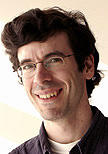
Jon was specifically recognized by the MacArthur Foundation for his contributions to network theory, explaining basic principles of navigability in both social "small world" networks and the World Wide Web.
I feel quite lucky to have rubbed shoulders with Jon. We were both studying with Eva Tardos in 1993, when I was getting my PhD research going and he was a precocious senior, both of us in the computer science department. Jon then got his PhD at MIT and is now a professor back at Cornell, where he just published a major textbook on algorithms, again with Eva.
It's very gratifying to see Jon getting such recognition. In a field where the merely smart labor through complexity, Jon's genius shines with a striking simplicity that makes the rest of us wonder, "How come I never thought of that?"
It's also very exciting to see the study of networks get this kind of attention. Could the MacArthur Foundation be riding the SNA hype curve, or are we really making some breakthroughs here? I think the latter.






